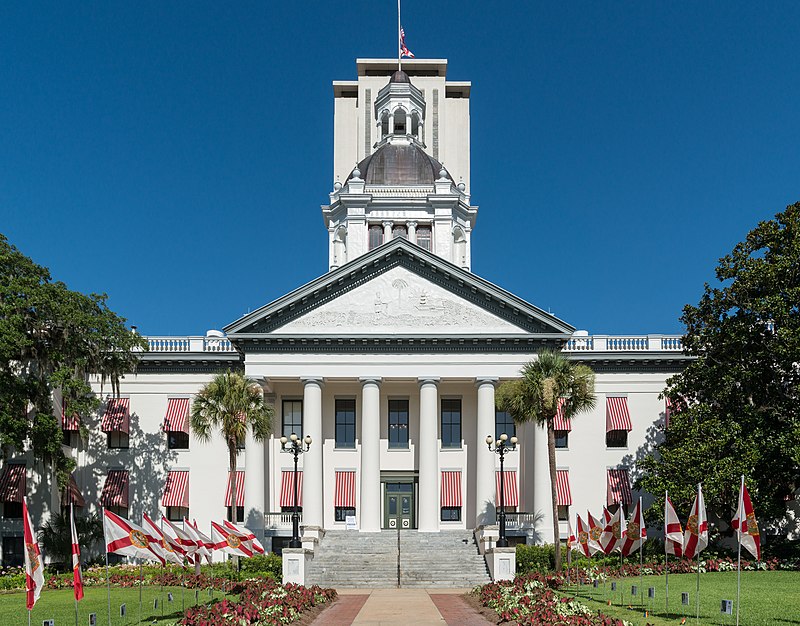
Michelle Berger is a student at Harvard Law School.
DeSantis’ Assault on Public Sector Unions
In May, Governor Ron DeSantis signed into law SB 256, a measure that endangers the future of public sector unions in Florida. The law prohibits Florida’s public sector unions from collecting dues through automatic paycheck deductions. It also requires a recertification election if less than 60 percent of workers eligible for a union’s representation pay dues to the union. Translation: the law makes it harder for public sector unions to collect dues, while simultaneously conditioning those unions’ security on their ability to collect dues from a supermajority of employees. The legislation exempts from this new scheme police officer unions, correctional officer unions, and firefighter unions. Non-exempt public sector unions include, among others, the Florida teacher’s union. With 150,000 members, the Florida Education Association is the largest union not only in Florida, but in the entire American Southeast.
Florida’s public sector unions challenged SB 256 in both state and federal court. The federal case is ongoing. This post focuses on the state court litigation, where the unions are raising compelling arguments under Florida’s state constitution.
The Litigation Strategy
In state court, the unions raised two state constitutional arguments. First, they argued that SB 256’s exception for certain unions violates the state constitution’s equal protection guarantee. Second, they argued that SB 256 violates employees’ state constitutional right to bargain collectively.
The unions’ fight in state court is far from over, but the litigation faced a setback in early October when the court dismissed the unions’ original suit for lack of standing. SB 256 became law in May, and that is when the unions filed their lawsuit. But SB 256 gave the unions until October 1st to submit documentation that at least 60 percent of represented workers are paying dues. By filing before the October 1st deadline, during the period when the unions were actively working to meet the 60 percent threshold, the court reasoned that the unions’ alleged harm was too speculative. Unless the unions appeal, this development signals the end of the unions’ equal protection claim because the court dismissed that claim with prejudice, finding that the unions had failed to state a cause of action. However, the court dismissed without prejudice the unions’ claim arising out of employees’ constitutional right to collectively bargain. Recognizing that the October 1st deadline has now passed, and thus implying that the unions ought to now be able to demonstrate standing, the court granted the unions 60 days to amend their complaint.
Understanding the unions’ remaining constitutional argument requires some familiarity with the Florida constitution. Article 1, Section 6 of the Florida constitution declares that “the right of employees … to bargain collectively shall not be denied or abridged.” (Florida is one of six states that protect the right to bargain collectively in the state constitution. The others are Hawaii, Illinois, Missouri, New Jersey, and New York). In a decision in 1988, the Florida Supreme Court declared that the right to bargain collectively is “a fundamental right” that “grants public employees the same right to bargain collectively with their employers as that granted to private employees.” The Court “presumed that the intent of the constitution is to grant the right of effective collective bargaining” (emphasis added). Therefore, “[a]ny restriction on the right to bargain collectively must necessarily violate” the Florida constitution. In Florida, the state may only abridge the right of state employees to bargain collectively to “vindicate[] a compelling state interest by minimally invasive means.”
The unions have not yet filed their amended complaint. But based on this understanding of Florida constitutional law, and on the unions’ filings in the litigation to date, three potential arguments become clear.
First, Florida’s public sector unions will be unable to bargain as “effectively” on behalf of employees if they must expend resources to achieve super-majority support each year, or else win annual elections. And thus, SB 256 violates Section 6. It further buttresses this argument that the Florida Supreme Court interprets the right to collectively bargain for public employees and private employees in parallel. Florida’s private sector employees are governed by the NLRA, which contains nothing remotely similarly to SB 256’s scheme. Thus, Florida’s private sector employees will not have their right to collectively bargain similarly burdened.
Second, under SB 256, the following scenario becomes possible: A union could enjoy majoritarian support such that it wins recognition as a bargaining unit’s representative. Through their union representatives, the employees would then collectively bargain a multi-year contract with their employer. But during any year of that contract, if the union fails to meet the 60 percent dues contribution threshold, it must win another election. If it loses, the collective bargaining agreement that the union has negotiated with the state could terminate prematurely. This result could deny the employees in the unit the protections they bargained for in their contract. It would functionally deny them their right to stable, “effective” collective bargaining. And, again, it would mean that public sector employees’ collective bargaining is burdened in a way that private sector employees’ collective bargaining is not. All these outcomes appear to violate the Florida constitution.
Finally, Florida’s constitutional right to bargain collectively is unique––it also declares that “the right of persons to work shall not be denied or abridged on account of membership or non-membership in any labor union or labor organization.” In other words, no Florida employee may lose their job because they do not want to pay union dues. But what about a Florida public sector employee who owes their job to protections enshrined in their collective bargaining agreement? Doesn’t this employee now have to pay dues (and convince his or her colleagues to do the same) in order to avoid the termination of the collective bargaining agreement, and thus of their job? This outcome of SB 256 may violate Section 6’s ‘right to work’ guarantee.
A Winning Strategy?
The unions’ potential argument is not only credible under the Florida constitution. It is further supported by some bad facts with which State may have to contend.
Animus toward the teacher’s union in Florida may explain the enactment of SB 256. Governor DeSantis and the Florida Education Association have been dueling since he launched an assault on public education through the “Stop WOKE Act,” which prohibits teachers from making students feel uncomfortable about their race, and also the “Parental Rights in Education” act, which restricts instruction on sexual orientation or gender identity in schools. In a not-so-subtle nod to this context, DeSantis signed SB 256 into law during a visit to a charter school. If animus is indeed behind the law, it ought not survive strict scrutiny.
Though the Court’s decision to dismiss one of the unions’ claims without prejudice is heartening, the ultimate outcome of the lawsuit is far from certain. Yet one thing is clear––the fate of public sector unions in Florida may depend on workers’ rights under the Florida Constitution.









Daily News & Commentary
Start your day with our roundup of the latest labor developments. See all
February 5
Minnesota schools and teachers sue to limit ICE presence near schools; labor leaders call on Newsom to protect workers from AI; UAW and Volkswagen reach a tentative agreement.
February 4
Lawsuit challenges Trump Gold Card; insurance coverage of fertility services; moratorium on layoffs for federal workers extended
February 3
In today’s news and commentary, Bloomberg reports on a drop in unionization, Starbucks challenges an NLRB ruling, and a federal judge blocks DHS termination of protections for Haitian migrants. Volatile economic conditions and a shifting political climate drove new union membership sharply lower in 2025, according to a Bloomberg Law report analyzing trends in labor […]
February 2
Amazon announces layoffs; Trump picks BLS commissioner; DOL authorizes supplemental H-2B visas.
February 1
The moratorium blocking the Trump Administration from implementing Reductions in Force (RIFs) against federal workers expires, and workers throughout the country protest to defund ICE.
January 30
Multiple unions endorse a national general strike, and tech companies spend millions on ad campaigns for data centers.